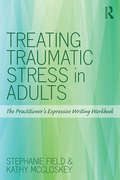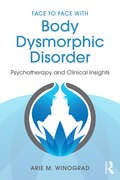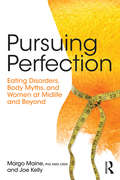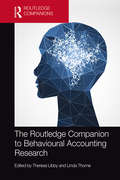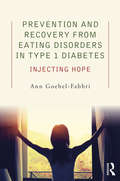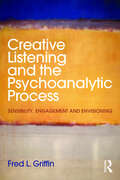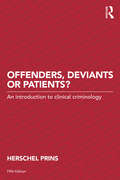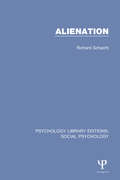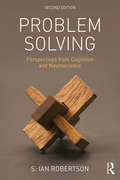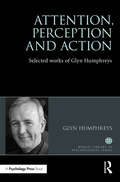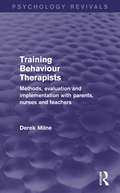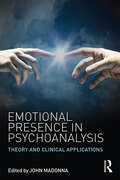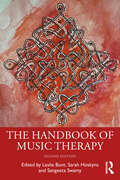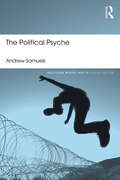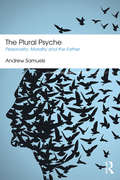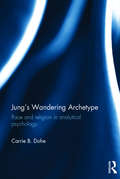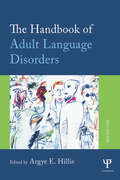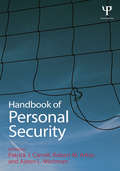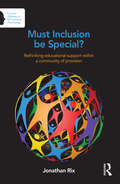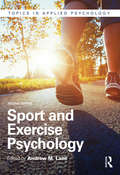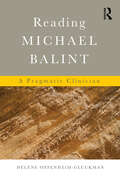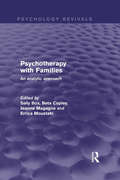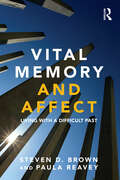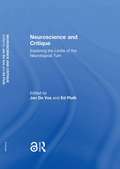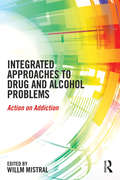- Table View
- List View
Treating Traumatic Stress in Adults: The Practitioner’s Expressive Writing Workbook
by Stephanie Field Kathy McCloskeyTreating Traumatic Stress in Adults is a resource for therapists of all disciplines for use in the treatment of adults suffering from post-traumatic stress. By reading this unique synthesization of information on the most current trauma treatments and expressive writing exercises, practitioners will gain an integrative and practical set of tools for treating post-traumatic stress. Also included are numerous diverse case vignettes, exercises for building trust in the patient/client relationship, and sections dedicated to exploring the client’s thought patterns and emotions to provide an opportunity for exposure, healing, and restructuring maladaptive beliefs.
Face to Face with Body Dysmorphic Disorder: Psychotherapy and Clinical Insights
by Arie M. WinogradIn Face to Face with Body Dysmorphic Disorder, BDD expert Arie Winograd shares his unique insights as a psychotherapist who has spent thousands of hours treating patients with this uniquely complex disorder. By specifically focusing on the patient-clinician relationship and exploring treatment options beyond the cognitive behavioral model, this groundbreaking new text offers a new perspective designed to help practitioners truly understand the emotional inner-workings of the BDD client, and in turn, how to genuinely connect with them in order to facilitate recovery. Also included are two chapters written by former BDD sufferers chronicling their personal struggles with the disorder.
Pursuing Perfection: Eating Disorders, Body Myths, and Women at Midlife and Beyond
by Joe Kelly Margo MaineIn Pursuing Perfection, authors Margo Maine and Joe Kelly explore the emotional, social and cultural factors behind the ongoing epidemic of disordered eating and body image despair in adult women at midlife and beyond. Written from a biopsychosocial and feminist perspective, Pursuing Perfection describes the many issues women encounter as they navigate a rapidly changing culture that promotes unhealthy standards for beauty and appearance. This updated and expanded edition (originally published as The Body Myth: Adult Women and the Pressure to Be Perfect) is a unique guide for anyone seeking practical tools and strategies for adult women looking to establish health and body acceptance.
The Routledge Companion to Behavioural Accounting Research (Routledge Companions in Business and Management)
by Theresa Libby Linda ThorneBehavioural research is well established in the social sciences, and has flourished in the field of accounting in recent decades. This far-reaching and reliable collection provides a definitive resource on current knowledge in this new approach, as well as providing a guide to the development and implementation of a Behavioural Accounting Research project. The Routledge Companion to Behavioural Accounting Research covers a full range of theoretical, methodological and statistical approaches relied upon by behavioural accounting researchers, giving the reader a good grounding in both theoretical perspectives and practical applications. The perspectives cover a range of countries and contexts, bringing in seminal chapters by an international selection of behavioural accounting scholars, including Robert Libby and William R. Kinney, Jr. This book is a vital introduction for Ph.D. students as well as a valuable resource for established behavioural accounting researchers.
Prevention and Recovery from Eating Disorders in Type 1 Diabetes: Injecting Hope
by Ann Goebel-FabbriPrevention and Recovery from Eating Disorders in Type 1 Diabetes: Injecting Hope sheds light on an often overlooked and misunderstood issue: the problem of eating disorders in women with type 1 diabetes – referred to by lay people and the media as "diabulimia" and characterized by insulin restriction as a means of calorie purging for weight loss. Drawing on a series of recent interviews and over 16 years of research and clinical experience with this unique phenomenon, author Dr. Ann Goebel-Fabbri provides groundbreaking insight into the lives of women who have recovered from eating disorders in type 1 diabetes. She explores the condition's origins, its effects on the lives of those affected, and possible paths to recovery. Also included are suggestions for prevention and treatment, as well as practical and inspirational advice from now-recovered women. Prevention and Recovery from Eating Disorders in Type 1 Diabetes is a valuable guide for patients and loved ones, diabetes treatment teams, and eating disorder clinicians.
Creative Listening and the Psychoanalytic Process: Sensibility, Engagement and Envisioning
by Fred L. GriffinContemporary psychoanalytic thinking about the interdependence of subjectivity and intersubjectivity has reenvisioned the analytic process, and with it the very nature of creative and engaged psychoanalytic listening. Yet few systematic writings on psychoanalytic listening or technique provide comprehensive instruction that would prepare the analyst for the kind of analytic listening needed to participate imaginatively in this sort of intersubjective experience.Offering a short course in analytic listening, Creative Listening and the Psychoanalytic Process provides a guide for the clinical uses of imaginative literature. Outside the psychoanalytic literature, extraordinary pieces of imaginative literature exist that provide the kind of experience in analytic listening that can guide clinicians in their work with patients. Certain works of fiction create textured, sensory worlds in which complex characters possessing shifting states of consciousness live within fluid emotional atmospheres. In this book, Fred Griffin demonstrates that by entering the worlds that original writers create in their texts, the psychoanalytic therapist will learn to attend more closely to varying emotional states that generate nuanced, multidimensional views of the analysand’s internal and relational worlds. He illustrates how these works capture more fully the sensory experience encountered by psychoanalysts when taking in what the patient communicates within the analytic space. Creative Listening and the Psychoanalytic Process presents case material alongside selected passages from works of fiction written by a range of creative writers, each of which stimulates analytic sensibility about this clinical experience. A conceptual framework is provided that makes these and other original works of fiction more accessible for these purposes. This book will be essential reading for psychoanalysts and psychoanalytic psychotherapists, as well as professors and graduate students studying psychoanalysis and literature. It will also appeal to literary scholars and those teaching and practicing in the field of narrative medicine.
Offenders, Deviants or Patients?: An introduction to clinical criminology
by Herschel PrinsOffenders, Deviants or Patients? provides a practical approach to understanding both the social context and treatment of mentally disordered offenders. Taking into account the current public concern, often heightened by media sensationalism; it addresses issues such as sex and ‘historic sex offending, ‘hate’ crime, homicide and other acts of serious bodily harm. This fifth edition is fully updated and incorporates the latest research and reflects recent changes in law, policy and practice, including: DSM-V criteria groundbreaking work on neuro-physiological aspects of psychopathy the Coroners and Justice Act Using new case examples, Herschel Prins draws on his own expertise and experience to examine the relationship between mental disorders and crime and looks at the ways in which it should be dealt with by the mental health care and criminal justice systems. Offenders, Deviants or Patients? is unique in its multidisciplinary approach and will be invaluable to all those who come into contact with serious offenders or those who study crime and criminal behaviour.
Alienation (Psychology Library Editions: Social Psychology)
by Richard SchachtFirst published in 1970, original blurb: ‘Alienation’ is the catchword of our time. It has been applied to everything from the new politics to the anti-heroes of today’s films. But what does it mean to say that someone is alienated? Is alienation a state of mind, or a relationship? If modern man is indeed alienated, is it from his work, his government, his society, or himself – or from all of these? Richard Schacht, in this intelligent analysis, gets to the root of these questions. Examining the concept of alienation in the works of Hegel and Marx, he gives a clear account of the origins of the modern usage of the term. Among the many insights to be gained from this analysis is a clear understanding of Hegel’s influence on Marx in this most crucial area. Mr Schacht goes on to discuss the concept of alienation in recent philosophical and sociological literature, particularly in the writings of Erich Fromm. Here he finds a great deal of confusion, which has resulted in a series of almost universally unquestioned misconceptions. This, then, is a book for all of us who use – and mis-use – the term ‘alienation’, and who are interested in the concepts it brings to mind. The arguments of Professor Walter Kaufmann’s introductory essay provide a useful background for Mr Schacht’s analysis. In this essay, Professor Kaufmann states that ‘henceforth nobody should write about alienation without first reading Schacht’s book.’
Problem Solving: Perspectives from Cognition and Neuroscience
by S. Ian RobertsonThe way that we assess and overcome problems is an essential part of everyday life. Problem Solving provides a clear introduction to the underlying mental processes involved in solving problems. Drawing on research from cognitive psychology and neuroscience, it examines the methods and techniques used by both novices and experts in familiar and unfamiliar situations. This edition has been comprehensively updated throughout, and now features cutting-edge content on creative problem solving, insight and neuroscience. Each chapter is written in an accessible way, and contains a range of student-friendly features such as activities, chapter summaries and further reading. The book also provides clear examples of studies and approaches that help the reader fully understand important and complex concepts in greater detail. Problem Solving fully engages the reader with the difficulties and methodologies associated with problem solving. This book will be of great use to undergraduate students of cognitive psychology, education and neuroscience, as well as readers and professionals with an interest in problem solving.
Attention, Perception and Action: Selected Works of Glyn Humphreys (World Library of Psychologists)
by Glyn W. HumphreysIn the World Library of Psychologists series, international experts themselves present career-long collections of what they judge to be their finest pieces - extracts from books, key articles, salient research findings, and their major practical theoretical contributions. Glyn Humphreys is an internationally renowned cognitive neuropsychologist with research interests covering object recognition and its disorders, visual word recognition, object and spatial attention, the effects of action on cognition, and social cognition. Within the field of Psychology he has won a number of prestigious awards, including the Spearman Medal, the President’s Award of the British Psychological Society, and the Donald Broadbent Prize from the European Society for Cognitive Psychology. This collection reflects the different directions in his work and approaches which have been adopted. It will enable the reader to trace key developments in cognitive neuropsychology in a period of rapid change over the last thirty years. A newly written introduction contextualises the selection in relation to changes in the field during this time. Attention, Perception and Action will be invaluable reading for students and researchers in visual cognition, cognitive neuropsychology and vision neuroscience.
Training Behaviour Therapists: Methods, Evaluation and Implementation with Parents, Nurses and Teachers (Psychology Revivals)
by Derek MilneOriginally published in 1986, one of the major developments in behavioural psychotherapy and mental health in the previous decade had been the growing involvement of non-psychologists in behaviour therapy. This was a result of the fact that there were too few psychologists to cope with problem behaviour and that other professionals or carers began to appreciate more clearly their potential as agents of behaviour change. Foremost among these ‘mediators’ of therapy were parents, nurses (particularly psychiatric nurses) and teachers (especially remedial teachers). Their involvement had greatly increased the efficiency of behaviour therapy at the time and opened up a new era in applied psychology. It also entailed the development of new training formats, evaluation procedures and implementation strategies. The main aim of this book was to provide a summary of the research relevant to these issues, and to offer practical guidelines to those who were interested in training or being trained as behaviour therapists. For this reason there are chapters by researchers who have been involved in training parents, nurses and teachers. These chapters provide a detailed account of training in a form that was rarely available in published form at the time, and even today should be of great assistance to readers.
Emotional Presence in Psychoanalysis: Theory and Clinical Applications
by John MadonnaEmotional Presence in Psychoanalysis provides a detailed look at the intricacies of attaining emotional presence in psychoanalytic work. John Madonna and a distinguished group of contributors draw on both the relational and modern psychoanalytic schools of thought to examine a variety of different problems commonly experienced in achieving emotional resonance between analyst and patient, setting out ways in which such difficulties may be overcome in psychoanalytic treatment, practical clinical settings and in training contexts. A focused review of relevant comparative literature is followed by chapters featuring individual clinical case studies, each illustrating particularly challenging aspects. The uniqueness of this book lays not simply in the espousal of the commonly accepted importance of emotional resonance between analyst and patient; rather it is in the way in which emotional presence is registered by both participants, requiring a working through, which at times can be not only difficult but dangerous. Such efforts involve a theory which enables the lens to understanding, an effective methodology which guides intervention. The book also calls for the art of the analyst to construct with patients meanings which heal, and possess the heart to persist in commitment despite the odds. Emotional Presence in Psychoanalysis is about patients who suffer, struggle, resist and prevail. It offers distinctive, transparently told accounts of analysts who engage with patients, navigating through states of confusion, hatred and more controversial feelings of love. Emotional Presence in Psychoanalysis features highly compelling material written in an accessible and easily understood style. It will be a valuable resource for psychoanalysts and psychoanalytic psychotherapists, psychologists and clinical social workers as well as teachers, trainers and students seeking to understand the power and potential of the analytic process and the resistances to it.
The Handbook of Music Therapy
by Leslie Bunt Sarah Hoskyns Sangeeta SwamyThe Handbook of Music Therapy takes the reader on a journey through the historical and contemporary landscape of the field of music therapy, updated with the latest practical, sociocultural and theoretical perspectives and developments in music therapy.The second edition is divided into four parts: foundation and context; music therapy practice; learning and teaching; and professional life. This includes the trajectory of music therapy as a health, social and community-based discipline in the 21st century with an evolving evidence base that also acknowledges the growing edges in the field, such as perspectives around equity, inclusion and diversity. The editors have included practice-based chapters including contributions from music therapy specialists in the fields of autism, adult learning disability, forensic psychiatry, neurology, immigration and dementia. The second edition is thoroughly updated to showcase a series of new interviews with Elders in the music therapy field, a thoroughly revised first section of the book with new materials on values and principles, updated chapters on music therapy practice, online and print resources supporting music therapy practice including musical illustrations with new and revised examples, and an extensively revised final section with new chapters on professional life and research.Illustrated with rich case studies and practical examples throughout, The Handbook of Music Therapy covers a variety of different theoretical and philosophical perspectives. It will be invaluable to music therapists (novices, students, professionals), other arts therapists and practitioners such as speech and language therapists, psychotherapists, teachers, community musicians, psychiatrists and social workers.
The Political Psyche (Routledge Mental Health Classic Editions)
by Andrew SamuelsWhat can depth psychology and politics offer each other? In The Political Psyche Andrew Samuels shows how the inner journey of analysis and psychotherapy and the passionate political convictions of the outer world are linked. He brings an acute psychological perspective to bear on public themes such as the market economy, environmentalism, nationalism, and anti-Semitism. But, true to his aim of setting in motion a two-way process between depth psychology and politics, he also lays bare the hidden politics of the father, the male body, and of men's issues generally. A special feature of the book is an international survey into what analysts and psychotherapists do when their patients/clients bring overtly political material into the clinical setting. The results, including what the respondents reveal about their own political attitudes, destabilize any preconceived notions about the political sensitivity of analysis and psychotherapy. This Classic Edition of the book includes a new introduction by Andrew Samuels.
The Plural Psyche: Personality, Morality and the Father (Routledge Mental Health Classic Editions)
by Andrew SamuelsPluralism can bridge the gaps that have opened up between personal experience, psychotherapy, and cultural criticism. In The Plural Psyche: Personality, Morality and the Father, a provocative, much praised and widely discussed book, Andrew Samuels lays bare the political implications of the personal struggle everyone has to hold their many inner divisions together. He also shows how pluralism can inspire new thinking in many areas including moral process, the construction of gender, and the role of the father in the development of sons and daughters. In addition, there are innovative chapters on clinical work, focusing on imagery and on countertransference. These themes come to life in a way that makes a significant contribution to debates about psychotherapy, gender, parenting and difference. This Classic Edition of The Plural Psyche includes a new introduction by the author.
Jung's Wandering Archetype: Race and religion in analytical psychology
by Carrie B. DoheIs the Germanic god Wotan (Odin) really an archaic archetype of the Spirit? Was the Third Reich at first a collective individuation process? After Friedrich Nietzsche heralded the "death of God," might the divine have been reborn as a collective form of self-redemption on German soil and in the Germanic soul? In Jung’s Wandering Archetype Carrie Dohe presents a study of Jung’s writings on Germanic psychology from 1912 onwards, exploring the links between his views on religion and race and providing his perspective on the answers to these questions. Dohe demonstrates how Jung’s view of Wotan as an archetype of the collective Germanic psyche was created from a combination of an ancient discourse on the Germanic barbarian and modern theories of primitive religion, and how he further employed völkisch ideology and various colonialist discourses to contrast hypothesized Germanic, Jewish and ‘primitive’ psychologies. He saw Germanic psychology as dangerous yet vital, promising rebirth and rejuvenation, and compared Wotan to the Pentecostal Spirit, suggesting that the Germanic psyche contained the necessary tension to birth a new collective psycho-spiritual attitude. In racializing his religiously-inflected psychological theory, Jung combined religious and scientific discourses in a particularly seductive way, masterfully weaving together the objective language of science with the eternal language of myth. Dohe concludes the book by examining the use of these ideas in modern Germanic religion, in which members claim that religion is a matter of race. This in-depth study of Jung’s views on psychology, race and spirituality will be fascinating reading for all academics and students of Jungian and post-Jungian studies, religious studies and the history of religion.
The Handbook of Adult Language Disorders
by Argye E. HillisThe Handbook of Adult Language Disorders is the essential guide to the scientific and clinical tenets of aphasia study and treatment. It focuses on how language breaks down after focal brain damage, what patterns of impairment reveal about normal language, and how recovery can be optimally facilitated. It is unique in that it reviews studies from the major disciplines in which aphasia research is conducted—cognitive neuropsychology, linguistics, neurology, neuroimaging, and speech-language pathology—as they apply to each topic of language. For each language domain, there are chapters devoted to theory and models of the language task, the neural basis of the language task (focusing on recent neuroimaging studies) and clinical diagnosis and treatment of impairments in that domain. In addition, there is broad coverage of approaches to investigation and treatment from leading experts, with several authors specializing in two or more disciplines. This second edition focuses on characterizing the cognitive and neural processes that account for each variant of aphasia as a first step toward developing effective rehabilitation, given that aphasia is one of the most common and disabling consequences of stroke. The best and most authoritative handbook in the field, The Handbook of Adult Language Disorders is the definitive reference for clinicians and researchers working in the scientific investigation of aphasia.
Handbook of Personal Security
by Patrick J. Carroll Robert M. Arkin Aaron L. WichmanThe issue of psychological security within an increasingly unstable, interconnected world has become a defining challenge of modern individual and cultural life. The terror attacks of September 11, 2001 and the global financial crisis that unfolded in 2008 have intensified a sense of global and personal insecurity. This concern with psychological insecurity is reflected in contemporary culture, politics, the business world, consumer behavior, the arts, and other areas. Within this context, the psychological sciences have kept pace, vigorously investigating these issues. This handbook features the latest theory and research examining cognitive, emotional, and behavioral responses to security threats. It expands the conceptual focus from specific security threats to the broader range of antecedents, processes, and consequences of psychological security/insecurity. The chapters are organized into four content areas: personal security in individual contexts, personal security in interpersonal contexts, personal security with cultural and health contexts, and interdisciplinary analyses of personal security. They represent a new and vibrant area of research unified by the common goal of understanding the factors that shape a sense of personal security. Together, these provocative chapters provide specific starting points that will shape future theory, policy, and practice on this dominant social issue of the 21st Century and, more importantly, offer opportunities to connect social and personality psychology to its scientific kin.
Must Inclusion be Special?: Rethinking educational support within a community of provision (Current Debates in Educational Psychology)
by Jonathan RixMust Inclusion be Special? examines the discord between special and inclusive education and why this discord can only be resolved when wider inequalities within mainstream education are confronted. It calls for a shift in our approach to provision, from seeing it as a conglomeration of individualised needs to identifying it as a conglomeration of collective needs. The author examines the political, medical and cultural tendency of current times to focus upon the individual and contrasts this with the necessity to focus on context. This book distinguishes the theoretical perspectives that are often associated with special or inclusive education and the broad range of interests which depend upon their ongoing development. This examination leads to a problematisation of mainstream education provision, our understanding of why social inequities emerge and how additional support can overcome these inequities. Further chapters explore the underlying challenges which emerge from our use and understanding of the notions of special and inclusive, outlining an alternative approach based upon a community of provision. This approach recognises the interconnectedness of services and the significance of context, and it encapsulates the aspiration of much international legislation for participation and inclusion for all. But it also assumes that we tend towards diffuse practices, services, policies, settings and roles, spread across provision which is variously inclusive and exclusionary. In seeking to create equitable participation for all, support needs to shift its focus from the individual to this diffuse network of contexts. Must Inclusion be Special? emerges from the research base which problematises inclusion and special education, drawing upon examples from many countries. It also refers to the author’s research into pedagogy, language and policy, and his experiences as a teacher and the parent of a child identified with special educational needs.
Sport and Exercise Psychology (Topics in Applied Psychology)
by Andrew M LaneThe new edition of Sport and Exercise Psychology asks four fundamental questions that get to the heart of this flourishing discipline: What inner states influence what people think, feel, and behave? How can people manage or self-regulate their own inner states? How can sport and exercise psychology professionals help people manage their inner states? Is sport psychology just a placebo effect? Taking an applied perspective that bridges the gap between sport and exercise, the book answers these questions by covering the key topics in the field, including confidence, anxiety, self-regulation, stress and self-esteem. There are also chapters on the role of music in performance, imagery and exercise addiction. Each chapter is written by an expert in that field, and includes a range of features illustrating specific issues, either within the research literature or their practical application. This is a comprehensive and engaging overview of an evolving discipline, and will be essential reading to any student of sport and exercise psychology. It will also be of huge interest to athletes and coaches seeking an accessible understanding of the role of psychology in sport.
Reading Michael Balint: A Pragmatic Clinician (Routledge International Handbooks Ser.)
by Helene Oppenheim-GluckmanMichael Balint is above all known for the "Balint Groups", which came to be a generic term for groups involved with the training of doctors and caregivers in the patient-caregiver relationship. Despite this, the origin and full import of his work has been somewhat overlooked. Hélène Oppenheim-Gluckman provides us with a concise account of how reading Balint has enriched psychoanalytic theory and its practice by broadening the indications for the psychoanalytic cure and the debate on psychotherapies and the training to the professional care-giver-patient relation. Reading Michael Balint: A pragmatic clinician shows how Balint must be considered as one of the major figures in the British Independent School of psychoanalysis, along with Winnicott and Fairbairn. Oppenheim-Gluckman argues that his ideas, and the implications of his work with groups of medical practitioners, have remained hugely influential within modern psychoanalysis and training in medical psychology. Reading Michael Balint presents a clear overview of the main tenets of his work. It provides a fresh perspective on Balint’s contribution and its importance for modern object relations theory and practice and brief psychotherapy. It will be an invaluable resource for psychoanalysts, psychoanalytic psychotherapists, counsellors and trainee psychoanalysts and doctors. Hélène Oppenheim-Gluckman is a psychiatrist and psychoanalyst, and has a doctorate in fundamental psychopathology and practises in Paris. She is a member of the Société de Psychanalyse Freudienne, the Société Médicale Balint, and a Balint Group "leader". She has published several books and a number of articles in psychoanalytic, medical, psychiatric and political-cultural journals.
Psychotherapy with Families: An Analytic Approach (Psychology Revivals)
by Sally Box Beta Copley Jeanne Magagna Errica MoustakiOriginally published in 1981, this study is the outcome of a clinical workshop based in the Adolescent Department at the Tavistock Clinic; its members at the time shared a tradition and interest in applying psychoanalytic principles to the understanding of groups and institutions and believed in the crucial relevance of these in work with families. It is written with the general reader in mind as well as those who work specifically in the field of family therapy or psychoanalysis. The approach is based on two particular developments; that of Object Relations Psychoanalytic practice, derived especially from the work of Freud and Melanie Klein; and the application of this to the understanding of Group Relations following the work of W.R. Bion and others, such as A.K. Rice and Pierre Turquet. It thus embraces the idea of the family as a system and includes attempts to understand the processes involved in such a system. But, unlike other comparable approaches, this one implies working with the group dynamics of the family, especially in terms of the way the family members perceive and engage the therapists. The attempt is to create a space for the family to relive and think about conflicts as they emerge in the therapeutic setting. Analytic theory is matched by much clinical material, and a glossary defines the key concepts.
Vital Memory and Affect: Living with a difficult past
by Steven Brown Paula ReaveyVital Memory and Affect takes as its subject the autobiographical memories of ‘vulnerable’ groups, including survivors of child sexual abuse, adopted children and their families, forensic mental health service users, and elderly persons in care home settings. In particular the focus is on a particular class of memory within this group: recollected episodes that are difficult and painful, sometimes contested, but always with enormous significance for a current and past sense of self. These ‘vital memories’, integral and irreversible, can come to appear as a defining feature of a person’s life. In Vital Memory and Affect, authors Steve Brown and Paula Reavey explore the highly productive way in which individuals make sense of a difficult past, situated as they are within a highly specific cultural and social landscape. Via an exploration of their vital memories, the book combines insights from social and cognitive psychology to open up the possibility of a new approach to memory, one that pays full attention to the contextual conditions of all acts of remembering. This path-breaking study brings together a unique set of empirical material and maps out an agenda for research into memory and affect that will be important reading for students and scholars of social psychology, memory studies, cultural studies, philosophy, and other related fields.
Neuroscience and Critique: Exploring the Limits of the Neurological Turn
by Ed Pluth Jan De VosRecent years have seen a rapid growth in neuroscientific research, and an expansion beyond basic research to incorporate elements of the arts, humanities and social sciences. It has been suggested that the neurosciences will bring about major transformations in the understanding of ourselves, our culture and our society. In academia one finds debates within psychology, philosophy and literature about the implications of developments within the neurosciences, and the emerging fields of educational neuroscience, neuro-economics, and neuro-aesthetics also bear witness to a 'neurological turn' which is currently taking place. Neuroscience and Critique is a ground-breaking edited collection which reflects on the impact of neuroscience in contemporary social science and the humanities. It is the first book to consider possibilities for a critique of the theories, practices, and implications of contemporary neuroscience. Bringing together leading scholars from several disciplines, the contributors draw upon a range of perspectives, including cognitive neuroscience, critical philosophy, psychoanalysis, and feminism, and also critically examine several key ideas in contemporary neuroscience, including: The idea of "neural personhood" Theories of emotion in affective neuroscience Empathy, intersubjectivity and the notion of "embodied simulation" The concept of an "emo-rational" actor within neuro-economics. The volume will stimulate further debate in the emerging field of interdisciplinary studies in neuroscience, and will appeal to researchers and advanced students in a range of disciplines including critical psychology, philosophy, and critical studies.
Integrated Approaches to Drug and Alcohol Problems: Action on addiction
by Willm MistralIntegrated Approaches to Drug and Alcohol Problems: Action on Addiction provides a pathway through the field of addiction, giving a clear description of points along that path, from the beginning of problematic use of drugs and alcohol, to treatment, support, recovery and reintegration in society. The book illustrates the principle of integrated approaches to tackling the rise in problems with addiction. Practical applications of these approaches are demonstrated in the work of UK charity Action on Addiction, one organisation which has been influenced by, and contributed to, the research and practice of the authors. The interventions illustrated within Integrated Approaches to Drug and Alcohol Problems demonstrate how the findings of international research can be brought together to provide effective services for individuals, families and communities suffering from addiction-related problems.Some of the foremost internationally recognized addiction researchers, clinicians and trainers from the UK, USA and Canada have contributed chapters to this book. It will be of interest to all those working in the field of drug and alcohol addiction, including counsellors and therapists, as well as GPs, nurses and public health officers. Integrated Approaches to Drug and Alcohol Problems will also have general appeal to anyone studying Psychology and Mental Health courses at undergraduate or postgraduate level, plus those affected by addiction.
